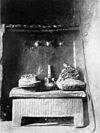Ekwensu is a trickster of the Igbo people, a trickster spirit of confusion, that serves as the Alusi (god) of bargains and the tortoise. Crafty at trade and negotiations. He is often invoked for guidance in difficult mercantile situations. He is perceived as a spirit of violence that incites people to perform violent acts. His companion was Ogbunabali.
Despite contemporary interpretations, Ekwensu was not originally regarded as the devil. With the rise of Christianity, the more beneficent aspects of the deity were supplanted by missionaries who came to represent Ekwensu as Satan. Europeans influenced their beliefs of good and evil to convince Igbo that Ekwensu was Satan-like. The goal of European's influence was to easily colonize the Igbo tribe, forcing them to be fearful of something. Originally, Ekwensu was highly honored as one of the benevolent lunar deities.
The traditional Igbo do not think of Ekwensu as the force that stands in opposition to other beings. Hence, Ekwensu is the IGBO god of war, who guided warriors in battle. They were tricksters. They only believe in spirits whose nature is either good or bad, but they do have what humans know as an afterlife.
He was the testing force of Chukwu, and along with Ani the earth goddess, and Igwe, the sky god, make up the three highest Arusi of the ancient Igbo people.
See also
References
- Ndubisi, Ejikemeuwa J . O. “The Notion of Satan.ekwensu.” OWIJOPPA, 25 Apr. 2020, https://www.academia.edu/42852598/The_Notion_of_Satan_Ekwensu.
- Kanu, Ikechukwu, Anthony.“The Hellenization of African Traditional Deities: The Case of Ekwensu and Esu.” African Scholar Journal of Humanities and Social Sciences. Vol.22. No. 6. Sept. 2021. ISSN: 2110-2086.
- ^ Molefi Kete Asante; Emeka Nwadiora (2007). Spear Masters: An Introduction to African Religion. University Press of America. pp. 108–. ISBN 978-0-7618-3574-5.
- A.I. Bewaji, John. "OLODUMARE: GOD IN YORUBA BELIEF AND THE THEISTIC PROBLEM OF EVIL." Archived 2010-05-17 at the Wayback Machine, University of Florida, Gainesville, April 03, 2010
- Ezeh, P-J. “The Ekwensu Semantics and the Igbo Christian Theolinguistics.” Google, Google, 2005, https://docs.google.com/viewer?a=v&pid=sites&srcid=c291dGhzYXhvbnMuY29tfGJlcnJ 5fGd4OjMyMDg0MzNlMjA2Mzg5NTg.
- Ndubisi, Ejikemeuwa J. O. PhD. “The Notion of Satan.Ekwensu.” OWIJOPPA, 25 Apr. 2020.
- Enugu, Discover. “How Evil Is Ekwensu?” Medium, 17 Nov. 2019, https://discoverenugu.medium.com/how-evil-is-ekwensu-23cb43786224
- Enugu, D. (2019, November 17). How evil is Ekwensu? Medium. Retrieved May 20, 2022, from https://discoverenugu.medium.com/how-evil-is-ekwensu-23cb43786224
Further reading
- Opata, Damian U. Ekwensu In the Igbo Imagination: a Heroic Deity Or Christian Devil, Nsukka, Nigeria : Great AP Express, 2005.
- Chinua Achebe, Things Fall Apart (New York: Doubleday, 1993).
- Opata, Damian U. Haunted Ontologies: Translation and Trauma in Postcolonial Igbo Society of Southeastern Nigeria.
| Odinala | ||
|---|---|---|
| Establishments |  | |
| (Primary) Arusi | ||
| Concepts | ||
| Topics | ||
| Sacred places | ||
| Derivatives | ||
This article relating to an African myth or legend is a stub. You can help Misplaced Pages by expanding it. |